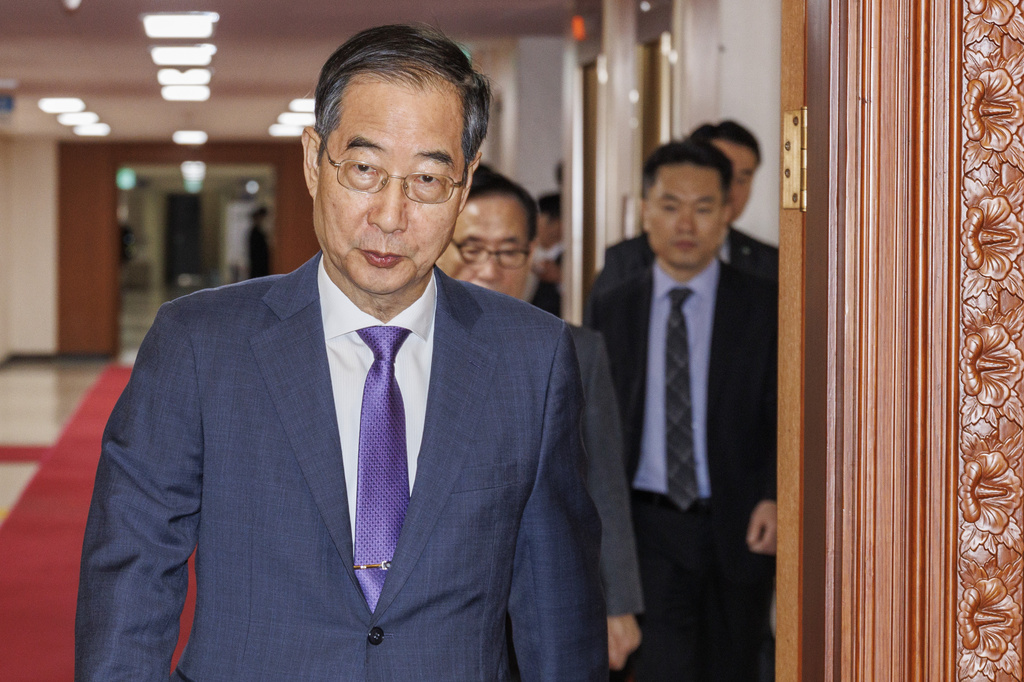
SEOUL - South Korean Prime Minister Han Duck-soo and almost all senior presidential secretaries on Thursday offered to resign over the ruling People Power Party's crushing defeat in parliamentary elections, local media reported citing the presidential office.
Han verbally tendered his resignation to President Yoon Suk-yeol and all the senior presidential secretaries, including chief of staff and chief secretary for policy, offered to step down except aides in the national security office.
South Korea's liberal opposition parties scored a landslide victory in a parliamentary election held on Wednesday, dealing a resounding blow to Yoon and his conservative party but falling just short of a super majority.
Yoon said he will humbly accept the will of people, shown in the elections, and will make his best efforts to reform state affairs and stabilize the economy and the people's livelihoods, according to the presidential office.
The number of parliamentary seats, snatched by the broader liberal opposition bloc, totaled 189, leaving the bloc short of the 200 seats needed for a super-majority
The quadrennial polls for 300 members of the National Assembly were carried out across the country to let voters cast ballots for 254 constituency seats and 46 proportional representation (PR) slots.
The liberal opposition bloc has won more than three-fifths of seats in the parliamentary elections, widely seen as a mid-term referendum to evaluate Yoon's management of state affairs.
The main liberal opposition Democratic Party took 161 directly-contested constituency seats, while its satellite parties secured 14 PR slots.
The minor liberal Rebuilding Korea Party earned 12 PR seats, while the minor center-left New Future Party and the minor leftist Progressive Party gained one respective seat in electoral districts. The number of parliamentary seats, snatched by the broader liberal bloc, totaled 189, leaving the bloc short of the 200 seats needed for a super-majority.
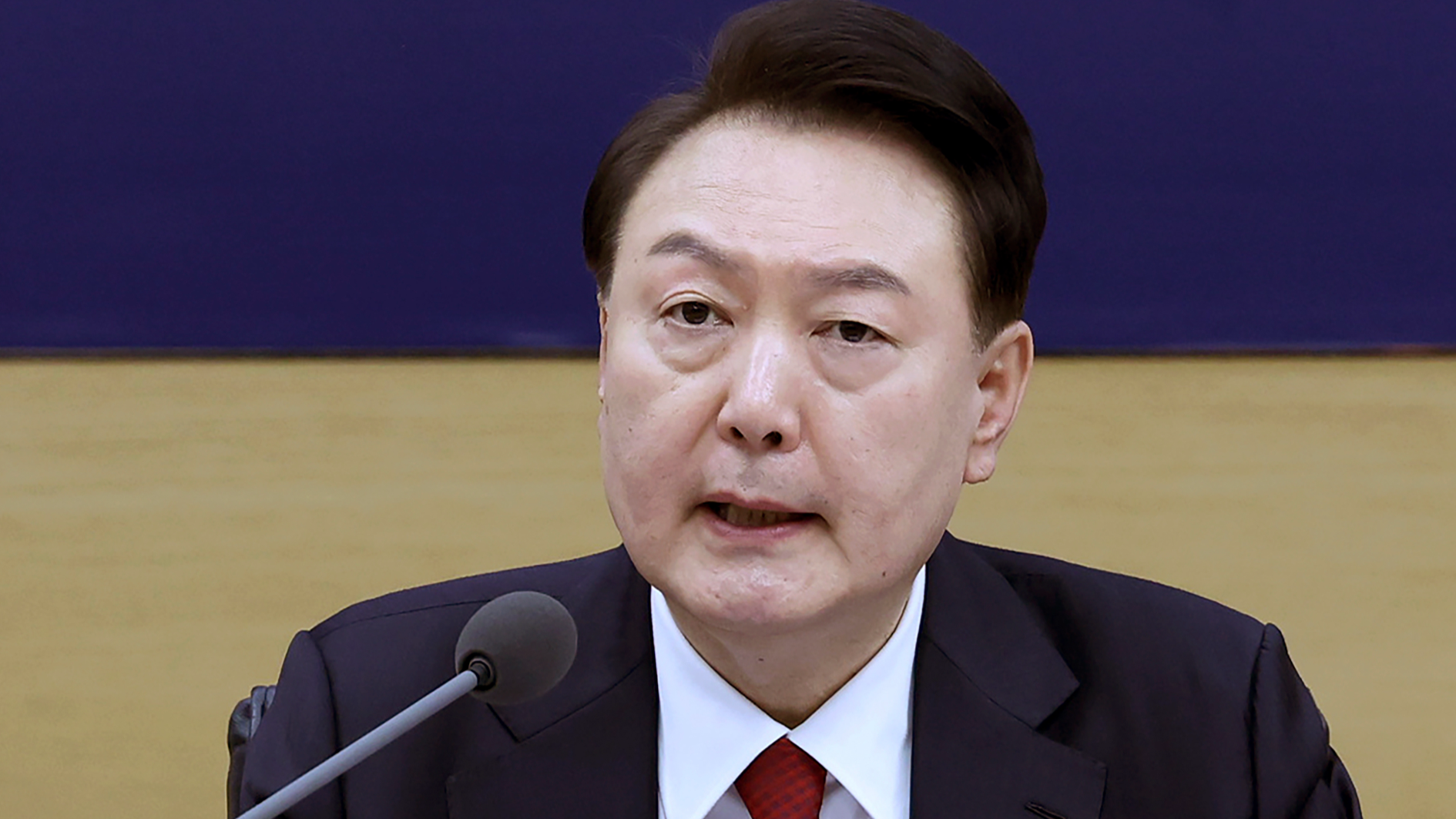
The governing conservative People Power Party and its sister party obtained 90 constituency seats and 18 PR seats each.
The minor center-right New Reform Party garnered one constituency seat and two PR seats.
An official announcement of the results is due later on Thursday.
Democratic Party leader Lee Jae-myung, who led a combative campaign against Yoon, said the top priority now was to work for an economic recovery that is palpable for the average consumer.
"The ruling and opposition parties must join forces to overcome the crisis in consumers' economic livelihood," he said.
In the 2020 general elections, then-ruling Democratic Party acquired 163 constituency seats and 17 PR slots, beating then-opposition People Power Party that took 103 parliamentary seats in addition to four seats won by conservative independent candidates.
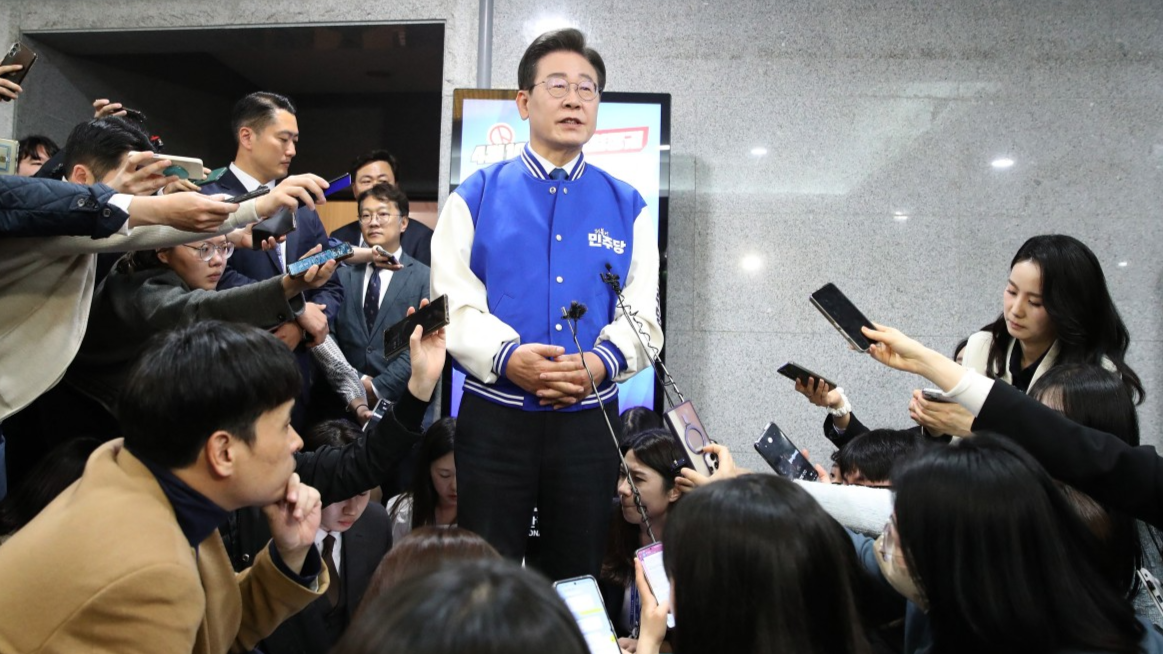
Low ratings
Yoon's popularity has suffered amid a cost-of-living crisis and a spate of political scandals.
Yoon, who took office in May 2022, was not up for election this time but his ability to pass legislation is likely to be further inhibited by the PPP's poor showing.
Opposition control of parliament will continue a government stalemate in areas where Yoon has clashed with the liberals on policies that require legislation, such as tax incentives for businesses and whether to tax capital gains on stocks, analysts said
He has suffered low ratings for months, hamstrung in implementing his pledges to cut taxes, ease business regulations and expand family support in the world's fastest ageing society.
Opposition control of parliament will continue a government stalemate in areas where Yoon has clashed with the liberals on policies that require legislation, such as tax incentives for businesses and whether to tax capital gains on stocks, analysts said.
Political science professor Lee Jun-han of Incheon National University said the poll had all the characteristics of a midterm election, with voters delivering a message that the government's economic policies were failing.
"With the opposition with nearly 190 seats or more, I think the difficulties with legislation, budget, and state administration will continue in the future," he said.
Analyst Kim Young-hwan of NH Investment & Securities said "expectations were inevitably weaker" for implementing Yoon's push to enhance the value of corporate stocks considered to be trading at a discount compared to global peers.
In early trading on Thursday, some stocks that had rallied on optimism around the government's so-called Corporate Value-up Programme, such as financials and automakers, fell on expectations the DP will likely block any tax cuts for corporations and wealthy investors.
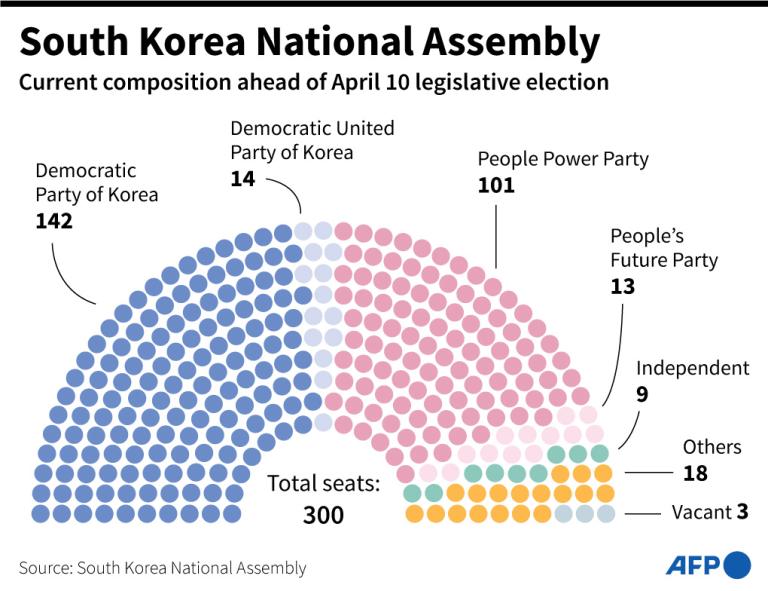
Local conservative newspaper Dong-A Ilbo said that voters passed judgment on the government of Yoon by offering a sweeping victory to the Democratic Party.
It marked the first time in the country's modern history that any governing party was beaten by such a large margin in parliamentary polls conducted as a mid-term election towards the incumbent government, the newspaper noted.
Another conservative daily Chosun Ilbo stressed that Yoon faced his biggest political crisis with the crushing defeat for the ruling party, saying that his policy agendas would run into danger.
At least 10 potential dissenters from the People Power Party could make it possible to override presidential vetoes, amend the constitution and even impeach the president, the newspaper warned.
The tentative final voter turnout was 67.0 percent, or 29,662,313 voters among the electorate of 44,280,011 people.
"Judgement" was the common theme running through comments by opposition victors, many of whom had campaigned heavily focused on what they said was Yoon's mismanagement of the economy and his refusal to acknowledge his wife acted improperly when she accepted a Dior bag as gift
It was higher than the previous election's 66.2 percent in 2020 and marked the highest in 32 years since the turnout posted 71.9 percent in 1992.
The turnout of early voting, held last Friday and Saturday, reached the highest 31.28 percent since the early voting was first adopted in the 2014 local elections for the nationwide election. It was higher than 26.69 percent in 2020.
The turnout of overseas voting, which continued for six days through April 1 among domestic voters staying abroad, logged a new high of 62.8 percent. The overseas voting was introduced in 2012.
'Judgement,' return of foes and lame duck
"Judgement" was the common theme running through comments by opposition victors, many of whom had campaigned heavily focused on what they said was Yoon's mismanagement of the economy and his refusal to acknowledge his wife acted improperly when she accepted a Dior bag as gift.
First lady Kim Keon-hee has not been seen in public since Dec 15 and was absent when Yoon voted, reflecting the view by some analysts and opposition party members that she had become a political liability for the president and his PPP.
The election also brought the return of some of Yoon's foes, including former justice minister Cho Kuk leading a splinter third party, former PPP leader Lee Jun-seok who had split with Yoon in a feud, and Choo Mi-ae, who as former justice minister clashed with Yoon when he was the top prosecutor.
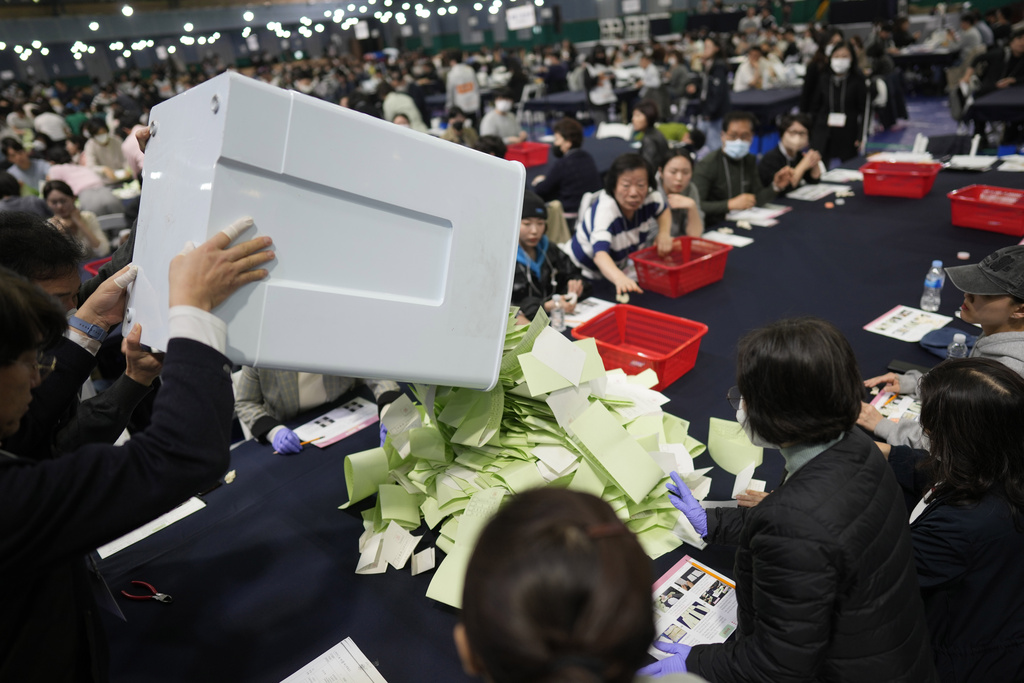
Yoon is, however, likely to avoid the super-majority of a two-third opposition control that could break presidential vetoes and pass constitutional amendments.
But nearing the end of the first two years of his five-year single term allowed by the constitution, Yoon was likely to slip into a lame duck status, some analysts said.
Mason Richey, a professor at Hankuk University of Foreign Studies, said Yoon might focus more on his overseas agenda now, though those plans could also be at risk if the opposition seeks to cut budgets.
"Given his likely lame duck status, the temptation for Yoon will be to focus on foreign policy where he will still have statutory power," Richey said.
With Reuters inputs


